Book contents
- Frontmatter
- Dedication
- Epigraph
- Contents
- Foreword
- Message
- Preface
- Acknowledgements
- INTRODUCTION The Uses of Error A Rizal Chronology
- 1 TURNING POINTS
- 2 “THE VERY SOUL OF THIS REBELLION”
- 3 DOCTOR RIZAL
- 4 “HALFBLOED”
- 5 “NO MARX OR LENIN”
- 6 UNDER THE SOUTHERN SUN
- 7 THE HOPE OF MILLIONS IN ASIA
- 8 “HIS NAME IS SWEET IN OUR MEMORY”
- 9 THE MYTH BUSTERS
- 10 “A GREAT HISTORICAL EXPERIMENT”
- Epilogue
- Appendices
- A A Man of Letters
- B Falling for the American Trap
- C “Colour and Scent, Light and Sound”
- References
- Index
A - A Man of Letters
from Appendices
Published online by Cambridge University Press: 21 October 2015
- Frontmatter
- Dedication
- Epigraph
- Contents
- Foreword
- Message
- Preface
- Acknowledgements
- INTRODUCTION The Uses of Error A Rizal Chronology
- 1 TURNING POINTS
- 2 “THE VERY SOUL OF THIS REBELLION”
- 3 DOCTOR RIZAL
- 4 “HALFBLOED”
- 5 “NO MARX OR LENIN”
- 6 UNDER THE SOUTHERN SUN
- 7 THE HOPE OF MILLIONS IN ASIA
- 8 “HIS NAME IS SWEET IN OUR MEMORY”
- 9 THE MYTH BUSTERS
- 10 “A GREAT HISTORICAL EXPERIMENT”
- Epilogue
- Appendices
- A A Man of Letters
- B Falling for the American Trap
- C “Colour and Scent, Light and Sound”
- References
- Index
Summary
A Man of Letters
Rizal wrote several hundred letters, and received hundreds more. Many have since been lost, but perhaps the greater part has survived. They cannot all be found in one place, however.
The Jose Rizal National Centennial Commission tried to collate everything in 1961, but while its volumes of collected correspondence gathered most of the letters in the Epistolario Rizalino, the landmark volumes edited by Teodoro M. Kalaw in the 1930s, as well as the family letters compiled by the Lopez Museum in One Hundred Letters in 1959, errors and omissions marred the collection. A few more letters have since been discovered (see, for instance, Schumacher 1977). And there may be more new letters from the rediscovery (dating back to at least 1995) of the Blumentritt trove in Ceske Budejovice, in the Czech Republic.
But there is no one definitive edition of the correspondence. This is a great pity, because the letters, together, constitute a distinct body of work. They may almost be said to be Rizal's first novel.
The scholar Raul Bonoan SJ has written, persuasively, on Rizal's understanding of the novel form as influenced by a “peculiarly Spanish philosophical movement known as Krausism” (Bonoan 1996b: 223). In brief, Rizal understood the novel not merely as fiction but as “the conveyor of historical meaning” (224). The same thing can be said of his letter-writing.
The draft of a March 1887 letter in French, preserved in a notebook and written it seems likely to his older friend in Paris, the painter Felix Resurreccion Hidalgo, explains what he tried to do in the Noli, then just off the press. “I have told our compatriots our defects, our vices, our culpable and cowardly complacency with the miseries over there. Whenever I have found virtue I have proclaimed it and render homage to it; and I have not wept in speaking about our misfortunes, instead I have laughed, because no one would want to cry with me over the misery of our native land, and laughter is always good to conceal our sorrows. The incidents I relate are all true and they happened; I can give proofs of them” (Rizal 1963b: 84).
- Type
- Chapter
- Information
- Revolutionary SpiritJose Rizal in Southeast Asia, pp. 237 - 242Publisher: ISEAS–Yusof Ishak InstitutePrint publication year: 2011



